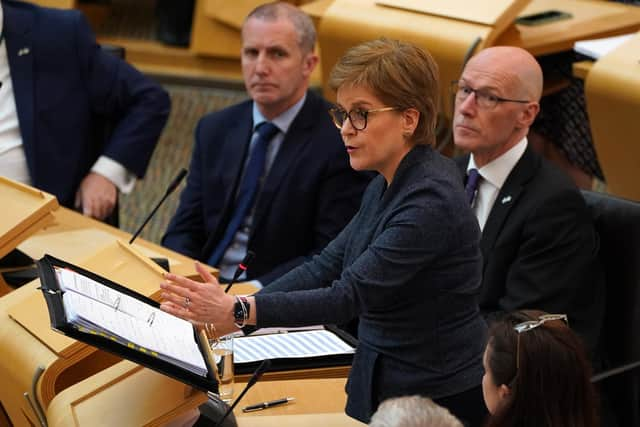Insight: Menopause has been taboo for too long - Dani Garavelli
In those days, the fictional prime minister of Denmark was holding together a fractious coalition while pursuing a sometimes feminist agenda.
Admitting to binge-watching the show, Sturgeon said: “It is one of the most credible fictional accounts of life in politics that I’ve seen on television, and it is told from a female perspective which is rare”.
Advertisement
Hide AdAdvertisement
Hide AdSince then, their careers have had uncanny parallels. Two years after meeting Sidse Babett Knudsen, who plays Nyborg, at a Q&A at the Edinburgh Filmhouse, Sturgeon became SNP leader and First Minister of Scotland. Like Nyborg, she placed gender equality high on her political agenda; like Nyborg, she introduced policies to increase the number of women on public and corporate boards.


Now in their early 50s, they are confronting a new challenge together: the menopause. In the latest series of Borgen, Nyborg experiences hot flushes, mood swings and erratic periods as she carries out her role as foreign secretary. Sometimes she has to change her blouse because it’s soaked with sweat. In one scene, she is shown discarding a box of Tampax, only to discover later that she has started bleeding again.
Meanwhile, Sturgeon has been telling TV presenter Kirsty Wark that Hormone Replacement Therapy (HRT) is helping her feel less “rage-fuelled”. In a frank interview, held as part of charity Menopause Café’s FlushFest22, she described sleepless nights and “terrifying moments” in Holyrood when “I would be mid-sentence and find myself thinking, ‘Do I know the word to say here or am I going to forget it?’”
These symptoms, and many others, will be familiar to many women going through the menopause and perimenopause. But seeing them depicted on television and hearing them talked about by a political leader is new and refreshing.


For Sturgeon, such honesty was a risk. Within hours of her interview being reported in a newspaper, her comments were being turned against her. Some of her critics claimed the menopause explained what they saw as deficiencies in her performance and others that she was using it as an excuse for those deficiencies.
“I can see it does make her vulnerable to speak out about this,” says Vicky Allan, co-author of Still Hot! 40 Brilliantly Honest Menopause Stories. “But it’s important to hear someone who is a leader and in a position of power talking about the menopause.
“We can debate the politics, but [Sturgeon] is clearly very capable, and demonstrating effective leadership. So when she talks about her own experiences, we can see women are carrying on, doing their jobs effectively while dealing with their symptoms.”
Women are hit by the menopause at the precise point in their lives where they are most likely to be taking on leadership roles. This is partly due to the expertise they have accrued, but also because, their children – if they have them – are likely to have grown up and left home, freeing them up professionally.
Advertisement
Hide AdAdvertisement
Hide Ad

During the interview, Sturgeon and Wark point out previous female leaders must have gone through theirs while in power. Margaret Thatcher became leader of the Conservatives at the age of 50 and prime minister at 54, yet never talked about it.
“We need women [like Sturgeon] to stand up and say, ‘This is where we are at’,” says Allan, “firstly because it is the only way women are going to get the support they need during this period of their lives. And secondly because it shows it is not plain sailing but women are still getting on with their lives.”
Until recently, the menopause was a taboo subject, even among women. The symptoms brought on by the reduction in the body’s production of oestrogen as menstruation ends, were simply to be tholed.
Even as discussions on other aspects of reproductive health – periods, fertility, miscarriages – began to gain traction, there was an omerta around what many referred to as the “change of life”. With older women already discriminated against, few wanted to draw attention to a phenomenon linked to the ageing process. They worried it would be seen as a form of weakness.
Because of this, many women grew up knowing nothing about the menopause. They were unable to empathise with their mothers’ experiences and unprepared for what they themselves would face.
GPs, too, were under-informed about the menopause. As with many aspects of women’s health, those who came looking for help often found themselves dismissed. It didn’t help that the symptoms are so wide-ranging – hot flushes, night sweats, low mood, anxiety, sore joints, palpitations, vaginal atrophy and many more. Or that, for a decade or so, the health risks of taking HRT were overestimated. As a result, those women who were prescribed HRT were told to take it for as short a time as possible and certainly less than five years. Others were told to put up with the symptoms, or fobbed off with antidepressants.
In the last few years, however, there has been a series of campaigns aimed at raising public awareness and lobbying for better treatment. They began, more or less, with Diane Danzebrink, who became suicidal in the wake of her hysterectomy in 2012. Danzebrink had been warned the surgery would cause a medical menopause, but was given little information on what that was likely to involve.
As it turned out, Danzebrink suffered an acute depression. After a terrifying moment when she almost drove her car into oncoming traffic, she went to her GP, who prescribed HRT. As she began to recover, she pledged she would start a campaign to prevent other women going through the same ordeal.
Advertisement
Hide AdAdvertisement
Hide AdAs soon as she felt well enough, she set up the Menopause Matters petition. It called for GPs to receive specific menopause training, for menopause guidance and support in every workplace, and for the menopause to be included on the school curriculum. The menopause has since been added to secondary school sex and relationship lessons across the UK.
Wark was also in the vanguard of those campaigning to raise awareness. She too experienced a medical menopause after she had a hysterectomy and her ovaries removed at the age of 47. The Newsnight presenter had been prescribed HRT but stopped taking it in the early 2000s after a breast cancer scare, so her symptoms continued. In her 2017 documentary, The Menopause And Me, she shared her own experiences, as well as interviewing experts and other menopausal women.
Counsellor Rachel Weiss was already involved in hosting death cafés – events where people are encouraged to talk about death – when she saw and was inspired by Wark’s documentary.
She formed Menopause Café as a social franchise, asking Wark to be its patron.
Weiss says: “What shocked me about Kirsty’s documentary was that so many of us go through it and yet there was this silence or shame around it. The idea was just to get people talking.”
Some 28 people turned up for the first event in Perth in 2017, but the movement grew quickly. Around 6,000 people have now attended menopause cafés across the world.
“My theory is my mum’s generation in the 60s had to pretend to be men so the last thing you are going to talk about is the idea you have hormonal fluctuations every month, or blood or menopause or anything reproductive,” says Weiss.
“I think it’s a hopeful sign we are able to name what goes on rather than stuffing tampons up our sleeves when we are going to the loo, and that we are now able to talk more freely about the menopause too.”
Advertisement
Hide AdAdvertisement
Hide AdMost recently it is Davina McCall’s documentaries, Sex, Myths And The Menopause and Sex, Mind And The Menopause, that have been garnering attention. The documentaries, which aired in 2021 and May this year respectively, promoted the benefits of HRT and testosterone which is sometimes prescribed to women experiencing a reduced sex drive.
The rehabilitation of HRT had already begun, when the study that led to the 2002 scare was reassessed. Experts concluded many of its findings – including a raised risk of breast cancer, heart disease and strokes – were wrong and that menopausal women had been victims of “fear-mongering”. Fresh analysis of the data found the extra health risks only applied to older patients, who would not normally use HRT.
McCall’s documentary took it one further, suggesting HRT was not only highly effective in dealing with many of the symptoms of the menopause (and protecting against osteoporosis), it might also have additional benefits such as protecting against dementia. No wonder women wanted it.
The number of HRT prescriptions had already been rising, but, after the first documentary, demand soared by 30 per cent, and by spring of this year there were shortages of Oestrogel, the most popular HRT drug, used by around 30,000 women. A postcode lottery in the prescribing of alternative gels is said to have led to some women rationing, or buying on the black market.
Sometimes it feels as if the pendulum has now swung from one extreme to the other. In the space of a few years, the menopause has gone from being unmentionable to a daily topic of conversation. The symptoms are now discussed in playgrounds, cafés, in newspaper opinion columns and on programmes such as Woman’s Hour and Loose Women. HRT has shifted from something to be wary of to a miracle cure.
Doctors are better informed and less likely to be dismissive of women. When I asked for HRT a fortnight ago (a coincidence – I did not know at the time I would be writing this piece) I met no resistance despite the fact my menopause has presumably been ongoing for several years.
Instead, my GP ran painstakingly through the risk-benefit ratio, telling me they fell firmly on the plus side until the age of 60. She told me women who still have a womb have to take combined HRT (progesterone and oestrogen), before prescribing me both patches and Utrogestan pills, which I was told was “breast cancer neutral”. It is too early to say what effect the treatment will have, but I felt I was listened to, and that the pros and cons were carefully explained.
The menopause has been pushed up the political agenda, too. Earlier this year, the UK government launched a taskforce “to tackle issues surrounding the menopause including increasing access to treatment and ending the taboos and stigma that still surround conversations about the menopause”. Its first meeting coincided with the Medicines and Healthcare products Regulatory Agency (MHRA) lunching a consultation on the reclassification of Gina, a locally-applied HRT product for vaginal atrophy, meaning women might be able to access a menopausal treatment over the counter at a pharmacy without a prescription.
Advertisement
Hide AdAdvertisement
Hide AdThe taskforce will draw on best clinical practice across all four UK nations, including Scotland’s Women’s Health Plan, which has pledged to ensure women who need it have access to specialist menopause services.
All this is down to the tenacity of campaigners. But there is still more to achieve. In Edinburgh, Caroline Phipps-Urch is pushing for NHS Lothian to make Utrogestan – the micronised, “body identical” progesterone, which I easily secured in Glasgow – available there.
The Scottish Medicines Consortium (SMC), which approves drugs for use in Scotland, rejected Utrogestan for general use in 2009 on economic grounds, although many health boards are still prescribing it.
Phipps-Urch, a yoga teacher who also runs menopause workshops as one half of The Menopause Sisters, launched a petition after discovering the only way she could have the tablets was to pay for them.
“I have tweeted Nicola Sturgeon a few times,” Phipps-Urch says. “I have said, ‘It’s great you are talking about the menopause, but you still can’t get the safest form [of the treatment] in NHS Lothian.
“I have a voice and I intend to keep shouting. This is the gold standard of HRT, why isn’t it available to all women who need it?”
There is more to be done on workplace discrimination too, with a small but growing number of women resorting to legal action against their employers.
Last year, social worker Maria Rooney, 50, brought a claim against Leicester City Council for disability discrimination on the grounds her menopausal symptoms had a substantial and long-term effect on her ability to carry out day-to-day activities.
Advertisement
Hide AdAdvertisement
Hide Ad“I was sitting in big meetings forgetting people’s names, I couldn’t get my words out. I felt embarrassed, some people were laughing at me,” she told her tribunal. “I was suffering from chronic fatigue. I was absolutely exhausted because I’d had no sleep at night because of night sweats, and my eyes would be closing while I was driving to work.
“I was forgetting to attend appointments and meetings. I’m usually a very confident person but I felt very anxious and low all the time. I’d try to do reports and I was getting brain fog. I couldn’t concentrate.”
Initially, the tribunal ruled her symptoms could not amount to a disability under the Equality Act. But this was later overturned in a landmark appeal which found menopausal symptoms were to be treated seriously, like any other kind of impairment, when assessing a claim for disability discrimination.
There are many positives to breaking the silence around the menopause, but there are also risks to women opening up about their negative experiences. The first is that employers could start to view women approaching 50 as a liability when in fact 25 per cent sail through the menopause without symptoms and the majority continue to work effectively with them.
“Kirsty Wark went through the menopause when she was presenting Newsnight, a quick-thinking environment where she had to perform publicly,” says Allan, who interviewed the broadcaster for her book.
“I remember her telling me she hadn’t let it impact her work, though it impacted her wellbeing and the rest of her life. I think that’s what a lot of women do – they focus on ensuring their work doesn’t suffer.”
The second danger is that so much discussion about symptoms might scare younger women unnecessarily. “Originally, the message was just put up and shut up. It’s fine and natural, don’t make a fuss,” says Weiss, whose own menopause has been relatively symptom-free. “Now it seems to have swung the other way: the menopause is horrific and awful, everyone should be on HRT.
“We have had people contact us saying, ‘I’m 50, I have a place at university for the first time in my life, which is brilliant, but maybe I shouldn’t take it because I am going to hit menopause.’ That’s what fear-mongering can do.” Weiss says it is also worth talking about the liberating aspect of the menopause, the end of monthly periods.
Advertisement
Hide AdAdvertisement
Hide AdThere may also be a risk of the menopause being over-medicalised as women come to feel they ought to be on HRT for the good of their wider health.
Allan took HRT briefly, but decided to stop when the version she was on didn’t work for her. She thinks the treatment should be accessible to all those who need it, but doesn’t want those who cannot or don’t want to use it to worry they are losing out on health benefits. She says: “You have to remember that for a very long time, women went through the menopause without HRT and their life spans were still longer than men’s.”
Both she and Weiss crave nuance, and for the menopause to be viewed in the round. This is why the latest series of Borgen is so important. It presents the menopause as part and parcel of a woman’s life. It highlights the symptoms and the difficulties they pose without suggesting women are diminished by them.
Nyborg has to change her blouse from time to time, she takes the occasional nap – but she still aces a demanding job.
Sturgeon’s speaking publicly about the menopause is vital, too. It shows women the rage they feel is not abnormal; that they are not alone. When they panic over the prospect of forgetting a word at a crucial moment, they know it’s something the First Minister does, too. And yet, there she is every Thursday taking on the opposition at FMQs regardless. That has to be a comfort.
Comments
Want to join the conversation? Please or to comment on this article.
